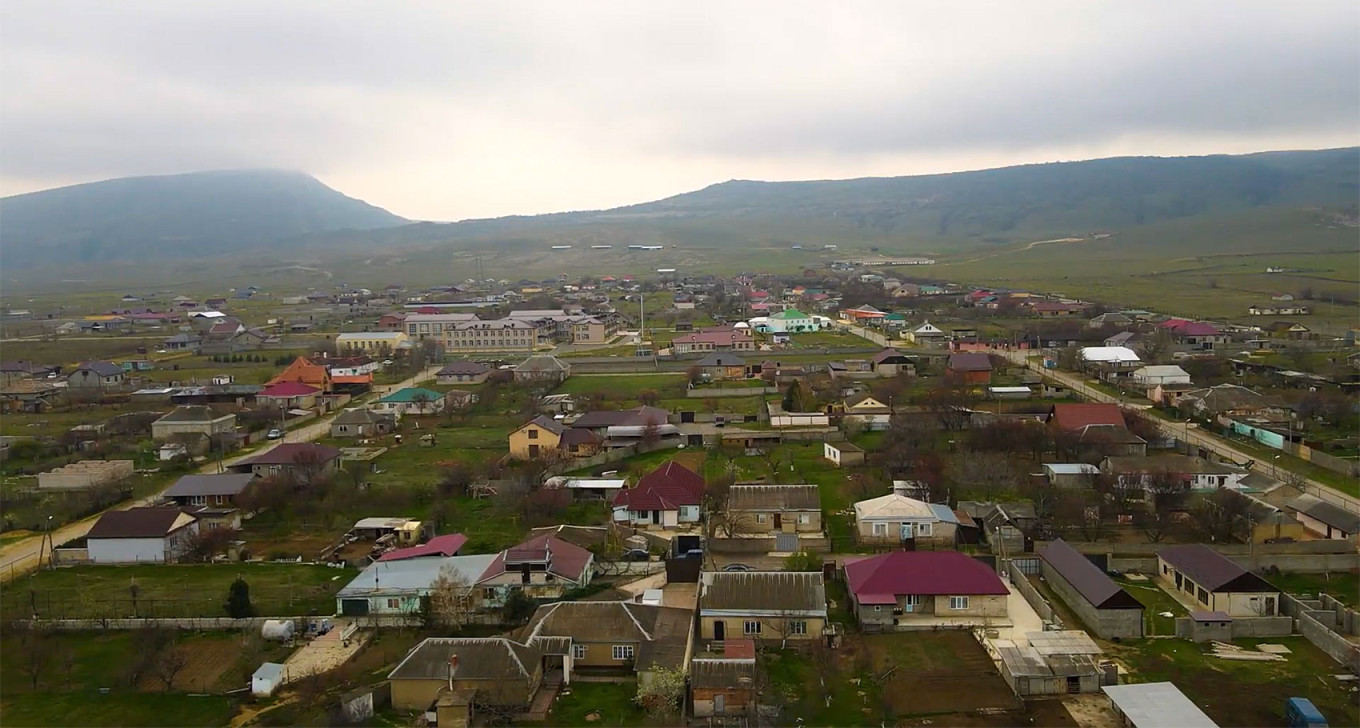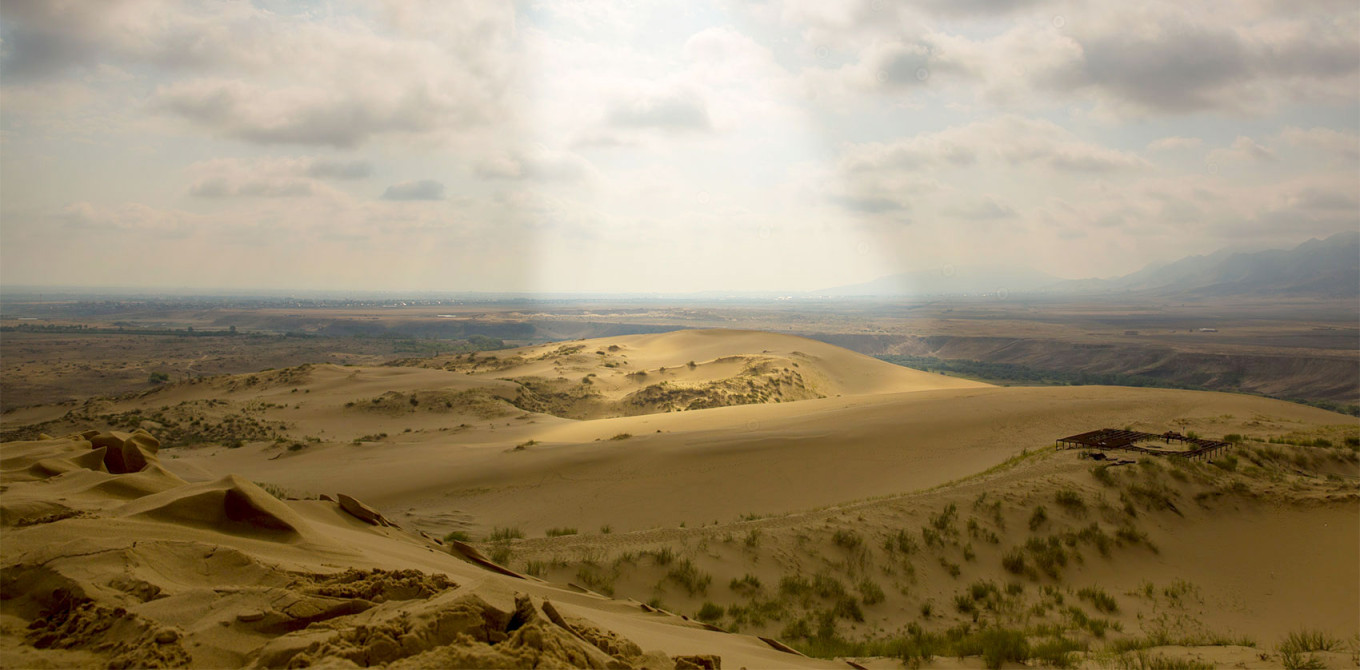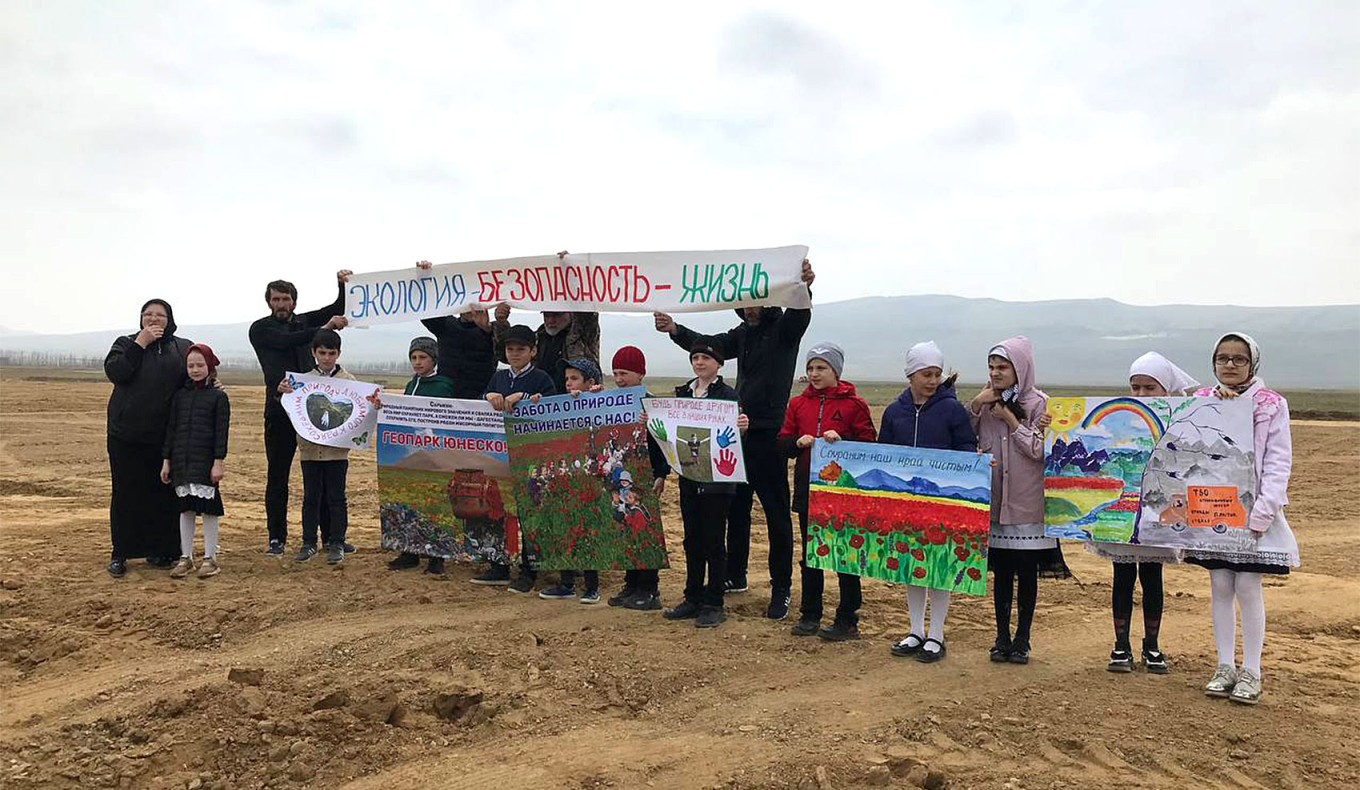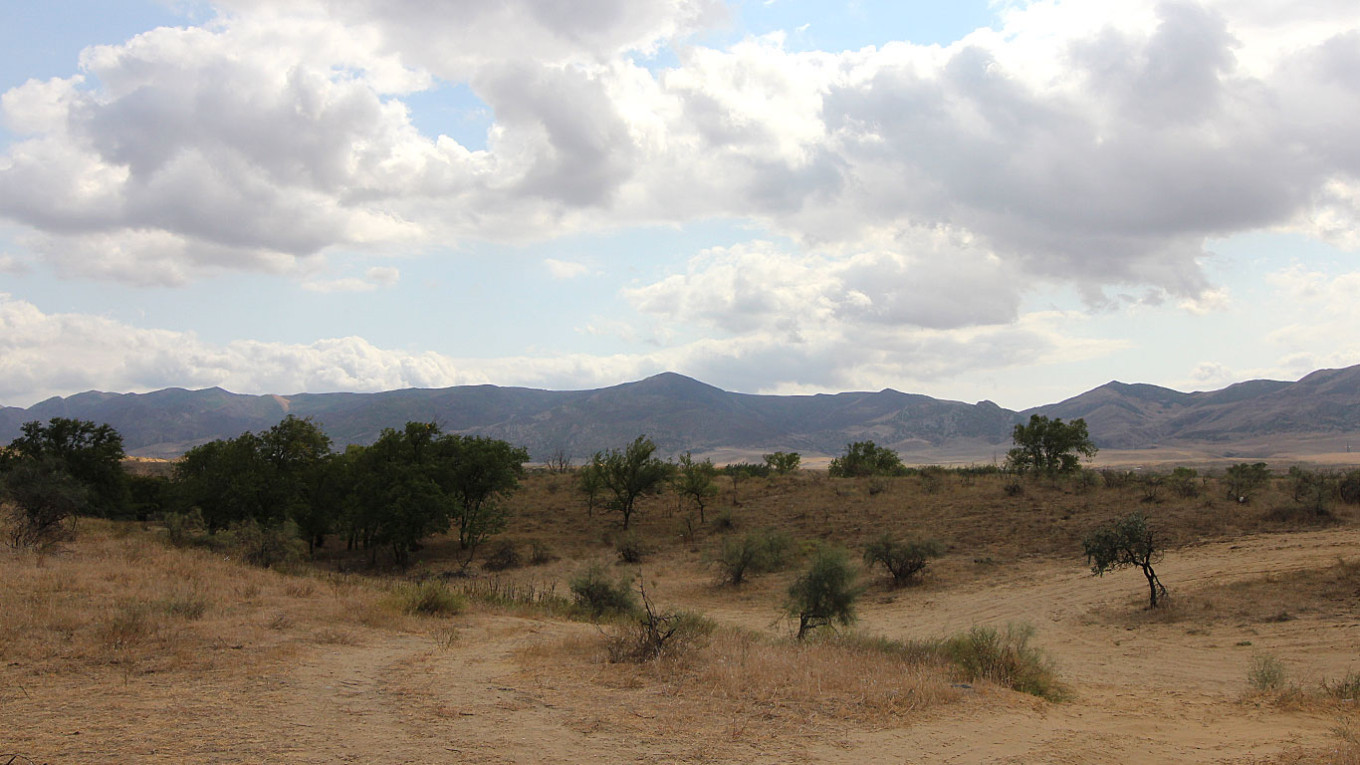Amid the plains of Russia’s North Caucasus republic of Dagestan lies Novaya Urada, a village of 1,000 residents.
This community, some 30 kilometers northwest of the regional capital Makhachkala, has deep roots in livestock farming and each year draws tourists hoping to photograph a vibrant poppy field nearby.
Yet Novaya Urada was thrown into upheaval early last year when residents, facing the construction of a waste dump just several hundred meters from their doorstep, had to resort to protests.
“Imagine: just as the livestock comes right out from the gates, it sees a beautiful landfill! Immediately!” a Novaya Urada resident who identified himself as Magomed told The Moscow Times.
“We learned that a landfill is planned to be built near our homes … without taking our opinion into account,” said Magomed, who withheld his surname in order to speak candidly.
“As a patriot and a local concerned about the children’s health, I of course joined the protest after reviewing the project papers.”

In one of the latest moves to address an escalating garbage crisis, regional authorities decided to build a landfill near this small community in the Kumtorkalinsky district, assuring locals from the beginning that they had nothing to worry about.
“The first time the conversation on this topic started … we didn’t even know such a term ‘landfill’,” Magomed said. “They told us about high-tech waste processing plants that Germany couldn’t even dream of.”
While three new waste-processing facilities should come to the republic in 2024, the site near Novaya Urada will serve as a conventional landfill expected to receive 300 tons of non-recyclable garbage each year.
‘Greta Thunberg of Dagestan’
In April 2023, Magomed was standing in the district police station as locals resorted to legal means to halt the works on the waste facility.
That day, alongside other Novaya Urada residents, he sought help from law enforcement. But the police officers just held him there for about an hour, citing minor errors in the paperwork.
“They tried to scare me and explain, like, ‘You’re addressing the wrong place, you first need to find out whose land it is. And who are you, what are your qualifications?’” Magomed said. “I blinked my eyes. ‘Where should we go then? We came to the police, after all. Where should we seek protection?’”
“In other words, the police wanted to lecture me so I wouldn’t do such things anymore and just send me home.”

Almost a year after construction began, residents continue to knock on all doors, refusing to accept the idea of living near the dump site, which they claim received the go-ahead without proper public hearings and environmental impact assessment.
Hundreds have protested and appealed to President Vladimir Putin several times over the past year, expressing concerns over the waste facility’s potential impact on the environment, human health and livelihoods.
“The neighbor [gardener] as a private investor will be directly affected both physically and financially from all sides. He might as well consider moving somewhere far away, leaving behind and writing off everything he invested there,” Magomed said.
Residents claim that the construction has already destroyed the poppy field that many previously enjoyed. Now they fear for the Sarykum Dune, a protected sand hill six kilometers from the planned waste site that is home to rare flora and fauna.
An abandoned oil well under the construction site further darkens the picture.
Even children have become involved, with a primary school student named Karima becoming known as a “local Greta Thunberg” after she spoke out.
With a stern tone and demeanor resembling that of the renowned Swedish climate activist, Karima posed a tough question to Putin and Dagestan’s head Sergei Melikov.
“I want to address Melikov and Vladimir Vladimirovich Putin. Why not build it near your city or village?” Karima said in a video published in January. “I want you to build this landfill in a location where there is no nature. After all, this whole area will be poisoned!”
As the protesters’ situation became more desperate, mobilized soldiers with Dagestani roots fighting in Ukraine joined the outcry. They addressed Melikov from the frontlines several times in an apparent last-ditch attempt to grab the authorities’ attention.
“From the first days, we have been in the zone of the ‘special military operation,’ ready to sacrifice our lives for the interests of our homeland,” an unidentified man in military uniform said in a video in September, with two other soldiers standing near him.
“But how can we fight here when the lives of our relatives and loved ones and the future of our nature are in danger?” he added.

In response to the backlash, authorities organized a few meetings with the public, making statements on the facility’s environmental safety and its full compliance with modern standards.
“I personally take responsibility for the fact that no harm will come to anyone from this facility,” Melikov said in August. “And we will show you on television how safe it is.”
Circular vision
Last year, Dagestan authorities acknowledged “problematic issues” with waste in the region, including waste management companies’ incapacity to handle increasing garbage volumes.
According to official data, the number of illegal landfills in Dagestan is on the rise, reaching 112 in 2022.
Dagestan’s hurdles are a symptom of Russia’s far-flung waste crisis, with mounting garbage becoming a growing headache for officials across the country.
Federal authorities voice a willingness to tackle the landfills problem but aim even higher. In recent years, their rhetoric has increasingly focused on shifting to a circular economy, a transformative model enabling reduced resource consumption through sharing, reusing and repairing, thus minimizing waste and combating climate change.
In January, Deputy Prime Minister Viktoria Abramchenko, who oversees the environment, named effective waste management and transition to a circular economy as the “primary directions” of Russia’s environmental policies. Among the goals for 2030 are recycling 100% of waste in the country and reducing landfilling by half.
While cases like Novaya Urada highlight the gap between a circular future and matters on the ground near people’s homes, Russia is indeed taking some strides toward a closed-loop economy.
As an example, the country is wasting fewer resources by directing more of them toward recycling, a circular economy expert told The Moscow Times.
However, measures to reduce waste in the first place, such as special product and packaging design, repairability and extending product life cycles, are still lacking.
“In general, the country has the intention to reduce landfilling,” said the expert, who requested anonymity due to their affiliation with a group that has been targeted by the Russian authorities.
“Gradually, the issue will be resolved, but for an effective result, it is necessary to increase the efficiency of all related processes, and it all starts with [reducing waste generation].”

The expert also pointed to the importance of proper garbage sorting when building waste-processing facilities like those in Dagestan. Currently, only 7.6% of household waste in Russia is extracted for second use due to inefficient sorting in residential areas.
“However, if separate collection by fractions is introduced, and food waste is separated, then the extraction of secondary resources … significantly increases and can reach 60-65%.”
But small towns and villages like those in Dagestan often lack waste collection points, containers and transport.
“Even if you organize separate waste collection at home, to dispose of it, you will have to go somewhere, to wait for recycling events. All this significantly hinders the launch of waste processing [in the country],” the expert concluded.
Uneven fight
While Dagestan officials grapple with a chronic waste problem with no easy fix, citizens have collected nearly 36,000 signatures against the landfill at Novaya Urada.
Troubles elsewhere in the region such as street garbage pileups or smoldering landfills do not add to residents’ confidence about the future.
In a clear lack of trusted dialogue between people and the state, Melikov once portrayed those opposing landfills as public enemies acting “in pursuit of big money.”

“We are concerned about our health. Politics there, politics here — leave us alone,” Magomed said. “We just care about our home, our garden, our future and our children — that’s all that concerns us.”
In a rare instance of the authorities siding with citizens, Dagestan’s Supreme Court deemed the lower court’s refusal to consider residents’ lawsuit to have been illegal in November.
But for now, construction continues as scheduled.
“I live by the principle that the impossible is possible. I certainly don’t give up. But the determination of me and a few others is not enough in this situation,” Magomed said.
“I hope that somehow, miraculously, they will reconsider [the project] because our forces are not equal, and we can’t do anything about it.”